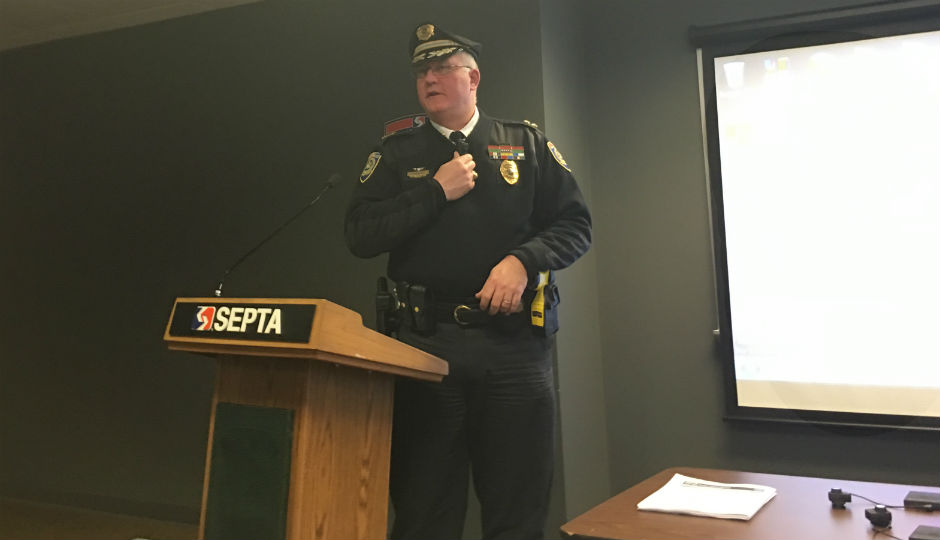All SEPTA Transit Police Now Wearing Body Cameras

SEPTA Police Chief Thomas Nestel demonstrates how officers will turn on body cameras. (Photo: Dan McQuade)
At least one suspect has already been captured with the help of a SEPTA police officer’s body camera.
At a press conference Friday outlining a department-wide launch of the $400,000 police body camera program, SEPTA Police Chief Thomas Nestel showed three videos taken from police body cameras. Fifteen officers had been wearing body cameras since a pilot program began in July 2014. The entire force began wearing them January 1st.
The first video Nestel showed at the press conference began with an officer talking with a man who Nestel said had been suspected of panhandling on the Market-Frankford El. The SEPTA officer asked him to get off at the York-Dauphin stop and sit on a bench at the station. Video shows the officer and the man exiting the El car, when a woman comes running toward them. She actually stops and puts her hands up, but the officer walks past her.
Unbeknownst to the police officer, Netsel said, the woman shown on video had allegedly snatched another SEPTA passenger’s phone as the two exited the El. A scream is heard in the background of the video; it was something that sounded like “she took my phone!” The officer didn’t hear it in time, though. But thanks to the body camera, a clear shot of the woman was circulated among transit police. Officials said she was eventually picked up.

The body camera SEPTA Transit Police will be wearing. (Photo: Dan McQuade)
“That’s the great thing about cameras,” Nestel said. “They provide an additional tool for somebody that really has no idea what’s going on. The officer’s got the camera on, she’s running down the platform. She thinks she’s caught, but she’s not — because the officer still has no idea what’s going on. That individual, the suspect, goes past. We were able to put out that image of the person right away to officers in the field and an arrest was subsequently made. Great evidence for court.”
Nestel showed two other videos from body cameras at his press conference. One showed a suspect being loaded into a wagon who spits at police as he entered. The other showed a handcuffed suspect banging his head against a patrol car. While the suspect did not file a use-of-force complaint, a bystander did file a report saying the man was roughed up by police. Nestel said the video showed otherwise.
The transit police chief pitched body cameras today as another tool for police. They’ve also been shown to reduce both reasonable and excessive police use-of-force, and reduce complaints against cops. While many other videos were available, a body camera would have given an additional view of the struggle with and Tasing of Omar Lopez outside Huntington Station in October of last year. Lopez died on the way to Aria Health-Frankford Campus.
“Body cameras will make good cops great,” Nestel said, “and keep everyone in line … what’s worthwhile for us is having another piece of evidence to present showing that we were either wrong or we were right. It’s not about defending the police. It’s about getting to the truth.”
Nestel admitted it has taken some effort to get the force to buy-in on body cameras. “I heard a great quote last week: ‘Cops hate two things: The way things are, and change,'” he said. As part of the rollout, Nestel has partnered with Drexel University to evaluate the impact of body cameras. Dr. Jordan Hyatt will lead a study measuring the public safety and fiscal implications of the program.
Police officers will not be recording video at all times. Transit cops have to turn on their cameras before interactions with the public. They won’t be required to turn them on during general “goodwill” efforts — giving directions and the like. Nestel said he understands there is a “learning curve” for officers even for remembering to turn on the cameras. “But when it becomes commonplace … there are going to be repercussions,” he said. He said such repercussions would vary depending on the circumstances.
Transit cops will not have access to the video from their cameras. After their shifts, they will put their cameras in the multi-docking station, where the videos will be uploaded to a central service that a limited number of people are given access to. The videos will be saved for 90 days, then deleted, unless they are flagged for additional retention. Officers are required by state law to tell people when they are being recorded.
The police are wearing Digital Ally FirstVu cameras, which Nestel said capture video at a 640×480 resolution and can usually record enough video and audio to last more than an officer’s shift.
Philadelphia magazine’s Joel Mathis interviewed Nestel about body cameras and other issues in the summer of 2014.
Follow @dhm on Twitter.